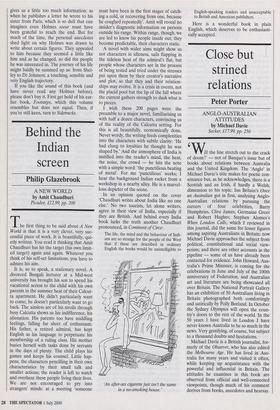Behind the Indian screen
Philip Glazebrook
A NEW WORLD by Amit Chaudhuri Picador, £12.99, pp. 200 The first thing to be said about A New World is that it is a very clever, very suc- cessful piece of work. It is beautifully, qui- etly written. You read it thinking that Amit Chaudhuri has hit the target (his own limit- ed target) again and again. Whatever you think of his self-set limitations, you have to admire his aim.
It is, so to speak, a stationary novel. A divorced Bengali lecturer at a Mid-west university has brought his son to spend his vacational access to the child with his own parents in the summer heat of their Calcut- ta apartment. He didn't particularly want to come; he doesn't particularly want to go back. The aimless arc of his strolls through busy Calcutta shows us his indifference, his alienation. His parents too have middling feelings, falling far short of enthusiasm. His father, a retired admiral, has kept English as his language to perpetuate his membership of a ruling class. His mother busies herself with tasks done by servants in the days of plenty. The child plays his games and keeps his counsel. Little hap- pens, the characters pencilling in their own characteristics by their small talk and smaller actions; the reader is left to watch and overhear these people living their lives. We are not encouraged to pry into strangers' minds: at a meeting 'someone must have been in the first stages of catch- ing a cold, or recovering from one, because he coughed repeatedly'. Amit will reveal no insider's diagnostic information on persons outside his range. Within range, though, we are led to know his people inside out; they become predictable, their characters static.
A novel with wider aims might show us not characters in idleness, sails flapping in the tideless heat of the admiral's flat, but people whose characters are in the process of being tested and tried under the stresses put upon them by their creator's narrative and plot, so that they and their relation- ships may evolve. It is a crisis in events, not the placid pool but the lip of the fall where the current gathers strength to dash what is to pieces.
I wish these 200 pages were the preamble to a major novel, familiarising us with half a dozen characters, convincing us of the reality of the Calcutta setting. For this is all beautifully, economically done. Never wordy, the writing feeds complexities into the characters with subtle clarity: 'He had clung to loyalties he thought he was shaped by.' And the atmosphere of India is instilled into the reader's mind, the heat, the noise, the crowd — he hits the note with a simple word: 'the punctilious beating of metal'. For me 'punctilious' works; I hear the background Indian racket from a workshop in a nearby alley. He is a marvel- lous depicter of the scene.
In an opinion quoted on the cover `Chaudhuri writes about India like no one else.' No two tourists, let alone writers, agree in their view of India, especially if they are British. And behind every India book lurks the truth another Chaudhuri pronounced, in Continent of Circe: The life, the mind and the behaviour of Indi- ans are so strange for the people of the West that if these are described in ordinary English the books would be unintelligible to An after-sex cigarette just isn't the same in a no-smoking house.'
English-speaking readers and unacceptable to British and American publishers.
Here is a wonderful book in plain English, which deserves to be enthusiasti- cally accepted.


























































 Previous page
Previous page